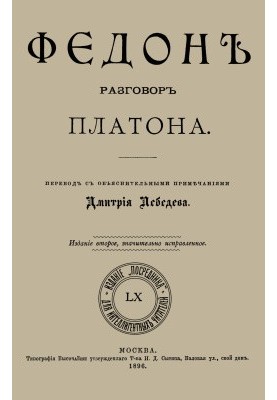Fedon
 Instant download
Instant download
after payment (24/7)
 Wide range of formats
Wide range of formats
(for all gadgets)
 Full book
Full book
(including for Apple and Android)
"Fedon" is one of the most famous and significant works of the ancient Greek philosopher Plato, written in the form of a dialogue that immerses the reader in deep reflections on the life, death and immortality of the soul. In this work, Plato conveys the last hours of the life of his teacher Socrates, who, waiting for the execution of the sentence, discusses with his students philosophical questions regarding the nature of the soul and its existence after death. The plot of the book takes place in a prison cell, where Socrates, surrounded by his devoted disciples, shares his thoughts that death should not be feared, but is only a transition to a different, more perfect world. He claims that the soul, being immortal, continues to exist after physical death. These ideas cause a lot of questions and disputes among his listeners, which makes the dialogue not only philosophical, but also emotionally rich. "Fedon" will be of interest to those who are fond of philosophy, history, as well as anyone who seeks to understand the deep aspects of human nature. This book is suitable both for students of philosophy and for a wide audience who want to think about the meaning of life and death. Readers interested in existentialism, metaphysics, and ethics will find many topics for reflection and discussion in The Phaedo. The themes raised in Fedon remain relevant to this day.. Plato addresses the questions of what true knowledge is, what the nature of reality is, and how we can know the world around us. He also explores the idea that philosophy is a preparation for death, which in turn evokes reflections on how we live and what is truly important in our lives. These questions, which concern mankind for centuries, make "Fedon" not just a philosophical work, but a real work of art that can inspire deep reflection. Plato's style in "Fedon" is clear and logical, which allows the reader to easily follow the course of thought of the heroes. His dialogues are full of rhetorical techniques and arguments, which makes them not only intellectually rich, but also fascinating. Plato masterfully creates an atmosphere in which philosophical ideas are revealed through live communication of the characters, which allows the reader to feel part of the discussion. In addition to Fedon, Plato is the author of other significant works, such as The State, Symposia and Timaeus, which also explore philosophical issues related to justice, love and the structure of society. By reading The Phaedo, you will be able to better understand the context and ideas that develop in these works, as well as see how Plato's philosophy influenced the development of Western thought. If you are looking for books similar in genre to "Fedon", pay attention to "Meditations" by Marcus Aurelius or "Immortality" by Yuval Noah Harari These works also raise important philosophical questions and can be a great addition to your reading. In conclusion, Plato’s Phaedo is not just a book about philosophy, but a deep reflection on life, death, and immortality that can change your perception of these concepts. This work deserves the attention of anyone who seeks to understand themselves and the world around them, and will certainly become a valuable contribution to your library.
LF/163590022/R
Data sheet
- Name of the Author
- Plato
- Language
- Russian
- Release date
- 1896
























